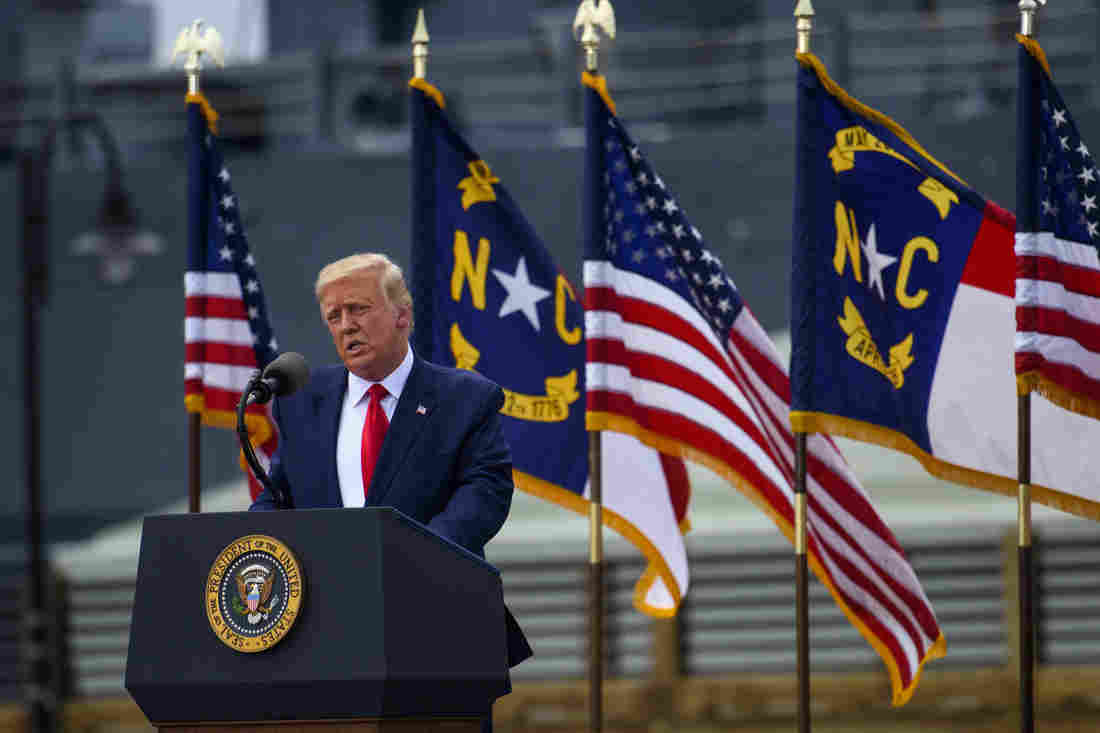News
US Election: Trump Tells North Carolina Voters To Vote Twice
US President Donald Trump has told people in the state of North Carolina to vote twice in November’s election, despite this being illegal.
Mr Trump suggested voters send a postal vote and then vote in person in order to test the system.

The president has frequently made false claims that postal votes are vulnerable to significant electoral fraud.
“Let them send it in and let them go vote,” he told North Carolina broadcaster WECT-TV on Wednesday.
“And if the system is as good as they say it is then obviously they won’t be able to vote (in person).”
On Thursday, he tweeted that if people vote by post they should also go to the polling station “to see whether or not your mail-in vote has been tabulated” and vote in person if necessary.
After President Trump made the initial comments, North Carolina Attorney General Josh Stein tweeted that he had “outrageously encouraged” people in the state to “break the law in order to help him sow chaos in our election”.
President Trump spoke to a local broadcaster in Wilmington, North Carolina
“Make sure you vote, but do not vote twice!” Mr Stein added. “I will do everything in my power to make sure the will of the people is upheld in November.”
Democrats have also accused President Trump and the Republican party of attempting to suppress the vote in order to help their side in the election.
President Trump was in Wilmington, North Carolina, to formally designate the city an American World War Two Heritage City.
What would happen if people tried to vote twice?
The electoral process is run by the individual states.
Karen Brinson Bell, executive director for the North Carolina State Board of Elections, has reassured voters that there are numerous measures in place to prevent anyone getting two votes registered.
Someone who has already voted by post would show up in an electronic pollbook used at polling stations, and prevented from voting, she said.
Only the first vote would be recorded, she added. And audits are carried out after each election to check voter history against ballots cast.
Voting twice intentionally is a crime, said Ms Brinson Bell.
When Mr Trump’s comments were put to Attorney General William Barr, he said it was unclear what the president meant.
Why the focus on postal votes for this election?
Several US states have allowed and encouraged postal voting for years.
But the number of people voting by post is expected to vastly increase in 2020 due to fears about gathering at polling stations in a pandemic.
As a result, dozens of US states have expanded postal voting for this election.
There are concerns the large volume of postal ballots may mean it takes days or weeks to count them all, long after Election Day has passed.
What are Trump’s claims about fraud – and is there any truth to them?
This isn’t the first time President Trump has made controversial comments about postal voting.
Speaking at the Republican National Convention (RNC) last month, he claimed “there’s tremendous fraud involved” with postal voting and that “we have to be very, very careful”.
But these claims have been strongly and repeatedly debunked by experts.
Ellen Weintraub, commissioner of the Federal Election Commission, responded at the time that “there’s simply no basis for the conspiracy theory that voting by mail causes fraud”.
In addition, numerous nationwide and state-level studies over the years have not revealed evidence of major, widespread fraud.
In the 2016 US presidential election, nearly one quarter of votes were cast by post, and that number is expected to rise this time round due to public health concerns over coronavirus.
Individual US states control their own voting rules for federal elections – and many are looking to increase postal voting to prevent large gatherings at polling stations on election day. A number of states are planning to hold “all-mail” ballot elections this November.
The rate of voting fraud overall in the US is between 0.00004% and 0.0009%, according to a 2017 study by the Brennan Center for Justice.
-

 Celebrity Gossip & Gist2 days ago
Celebrity Gossip & Gist2 days ago“Maybe the child is not his” – AY Comedian and estranged wife Mabel reportedly battle over custody of their second child
-

 Sports2 days ago
Sports2 days agoJake Paul defeats Mike Tyson by unanimous decision
-

 News2 days ago
News2 days agoKogi University dismisses four lecturers for sexu@l misconduct and examination malpractice
-

 Crime2 days ago
Crime2 days agoWoman sentenced for stabbing husband in domestic dispute over food



